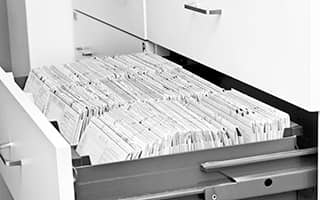Instant Court Case Lookup
The following is for information purposes only
Table of Contents
Court Dockets

A court docket is the official, chronological record that tracks every procedural event in a legal case from filing to final judgment. Maintained by the court clerk, the docket lists all key activities, such as pleadings, motions, hearings, rulings, and orders, providing a transparent overview of how a case progresses through the judicial system.
Court dockets are typically accessible to the public. Each docket entry includes essential details, such as filing dates, document titles, and case status updates, enabling courts, attorneys, litigants, and the public to monitor case development accurately.
Essentially, court dockets function as the court's official case management tool, preserving permanent records of judicial activity and facilitating efficient case administration within the legal system.
Purpose and Function of a Court Docket
For the judiciary, dockets are indispensable tools for case tracking and judicial efficiency. They help monitor deadlines, schedule hearings, and verify compliance with procedural rules. Attorneys rely on docket updates to stay informed about case progress and to prepare timely responses or filings.
Legally, maintaining accurate court dockets is a fundamental record-keeping requirement. Federal and state courts are obligated to provide access to most dockets through online databases and courthouse records through laws such as Rule 79 of the Federal Rules of Civil Procedure. This ensures that every case remains verifiable, auditable, and consistent with the principle of due process and open justice.
What is the Difference between a Court Docket and a Case file
A court docket is a summary or index of a case's activities. It provides an overview, showing what has happened in a case and when, but it does not contain the full documents themselves.
A case file, on the other hand, is the complete collection of all documents and evidence submitted in a case. This includes pleadings, motions, exhibits, transcripts, court orders, and judgments. Case files contain the substance of the case rather than just its procedural outline.
A court docket contains key details, including:
-
Case Number and Party Names: Unique identifier and list of all parties involved.
-
Dates of Filings, Motions, and Hearings: Chronological record of procedural actions.
-
Case Type and Jurisdiction: Indicates whether the matter is civil, criminal, probate, or small claims.
-
Entries for Orders, Judgments, and Dispositions: Records or rulings and case outcomes.
-
Example Entry: "10/12/2025 - Motion to Dismiss Filed by Defendant" shows when and by whom a procedural step occurred.
Types of Court Dockets
Court dockets differ according to the nature of the case and the jurisdiction handling it. The main categories include:
-
Civil Dockets: It contains records of lawsuits, torts, contract disputes, and family law matters.
-
Criminal Dockets: It tracks charges, arraignments, trials, and sentencing in criminal cases.
-
Traffic and Small Claims Dockets: It covers local matters such as traffic violations, landlord-tenant issues, and minor civil disputes.
-
Appellate Dockets: Documents the progress of appeals, including briefs, hearings, and appellate rulings.
-
Federal vs. State Dockets: Federal dockets handle matters under U.S. law, while state dockets record cases governed by state statutes and local court procedures.
How to Find and Search Court Dockets

Court dockets can be accessed online and in person, depending on the court system and the nature of the case.
Online docket search platforms such as PACER (Public Access to Court Electronic Records) provide access to federal court cases, while state and county court portals host local dockets. Both systems typically allow users to search by party name, case number, or filing date.
Some systems are free, providing basic summaries and hearing information at no cost. On the other hand, paid systems offer complete docket sheets, document downloads, or advanced search tools for a small fee.
In-person searches at courthouses remain an option, typically handled at the clerk's office using public terminals or request forms. In certain jurisdictions, users may need photo identification or legal representation to access restricted records.
Public Access vs. Restricted Dockets
Court dockets generally follow the open-records principle under the Freedom of Information Act and state sunshine laws, which promote transparency and public accountability. However, certain dockets, such as juvenile, adoption, and sensitive criminal cases, are sealed to protect privacy or ongoing investigations.
Sensitive information on court dockets, such as addresses, Social Security numbers, and financial data, is typically redacted for privacy. To access sealed dockets, individuals should file a motion with the court, showing a legitimate need that outweighs confidentiality concerns, before a judge grants limited or full access.
Interpreting Docket Information
Court dockets use standardized abbreviations such as MOT for motion, ORD for order, and JDG for judgment, and status indicators like active, disposed, closed, or appealed to show a case's progress. Docket sheets aid in legal research, tracking filings, rulings, and procedural developments efficiently.
Common Questions About Court Dockets (FAQs)
Here are answers to questions frequently asked on court dockets.
How can I search for a court docket?
Court dockets can be searched by party name, case number, or filing date through official court websites, state databases, or the PACER system for federal cases.
Are court dockets public or private?
Most court dockets are public records, ensuring judicial transparency. However, some are sealed due to privacy, security, or confidentiality concerns.
What does it mean when a docket is "sealed", and how can I access sealed dockets?
A sealed docket is restricted from public view, typically involving juveniles, adoptions, or ongoing investigations. Access requires filing a court motion showing legitimate interest and receiving judicial approval.
How much does it cost to access a docket or download court documents?
Access costs vary. Many state portals provide free searches, while PACER charges modest fees per page, usually about $0.10. Most document fees on PACER are capped at $3.00 for no more than 30 pages.
What do the different docket statuses mean?
Docket statuses show a case's stage. "Active" means it's ongoing, "disposed" indicates resolution, "closed" marks completion, and "appealed" signals the case is under appellate review.
What do common docket abbreviations and codes stand for?
Abbreviations like MOT (Motion), ORD (Order), NTC (Notice), and JMT(Judgment) summarize the court actions and filings within the docket.
How often are docket entries updated?
Entries are updated in real time or shortly after new filings, depending on the court's electronic system and clerical processing.
Can I obtain certified copies of docket records, and how?
Yes. Certified copies can be requested from the clerk of court, either in person or online, usually for a small administrative fee.
What's the difference between a docket sheet and the full case file?
A docket sheet lists procedural events and filings, while the case file contains the complete set of legal documents, evidence, and rulings.
Can non-attorneys view or download court filings?
Yes. Most courts allow non-attorneys to view or download filings through public databases like PACER or state portals, except for restricted or sealed cases.
Do courts require ID or authorization to access docket documents?
For public dockets, ID is usually not required online. However, in-person access at the courthouse may require a photo ID or authorization for sensitive records.
Are there restrictions on viewing dockets involving minors, adoptions, or grand jury materials?
Yes. Such dockets are typically sealed or partially redacted to protect privacy and comply with confidentiality laws.
How do I appeal or challenge a sealed docket access decision?
To challenge denial, file a motion to unseal with the court, stating a valid legal or public interest reason. Judicial approval is typically required.
How do I interpret or read a docket entry?
Each entry lists a date, action, or motion filed, and court response. For example, "02/12/2025 - MOT to Dismiss Filed" shows a motion submitted on that date for court review.